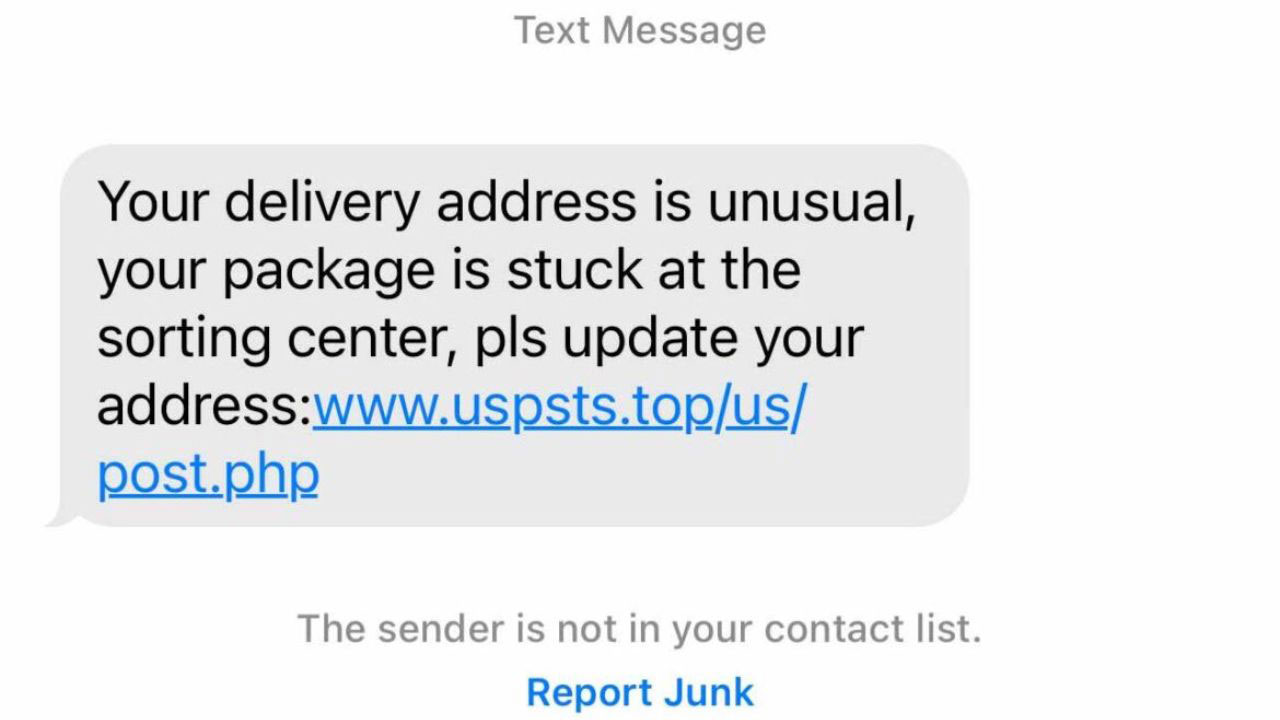I know you must be very busy these days. You probably have a lot to do, like preparing food, visiting family and friends, and shopping for gifts. Although it’s a fun and festive time of year, it can also be stressful.
And you know who loves to take advantage of that stress? Scammers. They are always looking for ways to trick you and steal your money or personal information. They have some sneaky tricks up their sleeves, especially around the holidays. That’s why I want to warn you about 5 of the most common scams you might encounter during this season and how to protect yourself.
5 common money scams to watch out
1. Package delivery scam
With the holiday season in full swing, the end-of-year sales have begun and you probably have already started your holiday shopping and expecting packages coming via different types of delivery services like FedEx, UPS, or USPS. So if you receive a text that mentions a package delivery, you may be likely to easily fall for a scam.
I was expecting a package recently and received this text out of the blue:

MORE: 35 BEST BLACK FRIDAY DEALS
Even though the text says the sender is not in my contact list and that it may be junk, I almost clicked the link because I was so focused on the fact that there may have been a typo in my delivery address. But once I looked a little closer, there were a few red flags in this text message that tipped me off to it being a scam.
- First – the link does not lead you to usps.com – it’s a fake link that scammers hope you won’t notice. Notice it is uspsts.top…and not usps.com. This is a common scam going around called typosquatting, where a scammer uses a domain that looks close to a real website. Next, the text says “pls” which is lingo you likely wouldn’t see in correspondence from the USPS. Scammers often make typos or use poor grammar when communicating, so always double-check.
- Scammers are sending emails, texts, and even occasionally, there could be a phone call that is regarding an issue with package delivery. It may be something like this text I received that has a link where they’ll end up asking for information, or you may be asked to pay a “shipping fee” to get your package.
- Be sure to always have good antivirus software running on your devices to prevent any disasters from happening if you were to click on a malicious link. See the best 2023 antivirus protection winners for your Windows, Mac, Android & iOS devices.
How to avoid package delivery scams
If you are expecting a package and you’re wondering if you’ve received real information or not about it, the best way to check is to go to the original confirmation you received about shipping. You most likely received an email regarding your package, and if you go to that email to get your order number, you should be able to look up the status of your order directly on any website.

MORE: BEST BLACK FRIDAY LAPTOP DEALS
2. Charity scams
Sadly, charity scams aren’t new, but they are way more prevalent during the holiday season since scammers are hoping you’re feeling more generous during this time of year.
Sometimes scammers may create fake names of organizations to get you to donate money, or they may reach out to you via phone/email/text, posing as someone working for a legitimate charity. Social media has also become a popular place for charities to market themselves to reach more eyes in hopes of donations, so scammers may try and pose about fake charities.
These schemes will try and appeal to your emotions during this season, so be sure double check where you donate your money so you don’t fall for a scam.
How to avoid charity scams
Never give your money to anyone immediately who approaches you or reaches out on behalf of any organization without doing your own independent research. Either do a little googling or check with a family member to see if it’s real, and if it is, you should be able to donate on an official website or to an official address. You can always mention this to anyone who asks you to donate somewhere – don’t fall into the pressure of donating right then and there.
Also, always double-check the name of an organization. Sometimes (especially online), scammers will alter the name of a known organization slightly to trick you into donating.
3. Social media gift exchange scam
The Better Business Bureau is warning about a gift exchange scam with a new twist, which has been occurring during recent holiday seasons. It’s an online version of the popular “Secret Santa” gift exchange. However, the BBB says these social media-driven gift exchanges are actually pyramid schemes, and you will most likely be disappointed if you participate.
In the past few years, variations of the gift exchange have popped up, with someone asking you to select a random person and send them a gift to pay it forward. Another asks you to exchange bottles of wine with someone else, and while it seems fun and light-hearted, you don’t know who is on the receiving end.
How to avoid social media gift exchange scams
It may sound nice to send a holiday gift to a stranger in turn for receiving multiple gifts yourself, but you’re never going to receive many (if any) gifts at all. Don’t participate in gift exchanges with anyone you don’t know, or you won’t be able to guarantee you’ll actually be gifting someone who isn’t a scammer.
4. Gift card scams
Gift card scams are another popular method that has been rising in popularity recently, but it’s especially important to watch out for the possibilities since you may be purchasing gift cards for friends or family for the holidays.
Scammers often steal gift cards and use the information before they make it look like they didn’t. They have a number of methods for tricking you using gift cards, so if you can send an online one (so that you can ensure you’ve purchased it on a legitimate, official website), that would be a much safer alternative.
How to avoid gift card scams
If you’re getting anyone a gift card and buying it in person, be sure to check that the package hasn’t been tampered with. Double-check that nothing on the packaging looks suspicious since scammers will try and make it seem like the package was sealed, but they will already have used the gift card so you’re essentially buying a useless piece of plastic.
Learn more about dangerous gift card scams going on this year:
MORE: THE BEST WAY TO BUY GIFT CARDS EVER
5. Fake online shopping sites scam
One of the most common scams during the holiday season is the fake online shopping site scam. Scammers create websites that look like legitimate online stores but are actually designed to steal your personal and financial information. They may offer products at very low prices or claim to have limited-time deals or exclusive items. They may also send you phishing emails or text messages with links to these fake sites.

Some signs of a fake online shopping site are:
- The website address does not match the name of the store or brand.
- The website has poor design, spelling, and grammar errors.
- The website does not have a secure connection (https) or a padlock icon in the address bar.
- The website asks for too much personal information, such as your social security number or bank account details.
- The website does not have a clear return policy, contact information, or customer reviews.
To avoid falling victim to this scam, you should:
1) Shop only from trusted and reputable online stores that you know and have used before.
2) Check the website address carefully and look for any red flags.
3) Do some research on the online store before making a purchase. Read customer reviews, look for ratings, or search for complaints online.
4) Use a credit card or a secure payment service like PayPal when shopping online. Do not use debit cards, wire transfers, or gift cards.
5) Keep track of your online purchases and monitor your bank statements for any unauthorized charges.
6) Use Antivirus protection: An effective antivirus software is a must-have. The best way to protect yourself from clicking on any malicious links on fake websites, in phishing emails and text messages is to have antivirus protection installed and actively running on all your devices. It’s the best to help stop and alert you of any malware in your system and ultimately protect you from being hacked.
See my expert review of the best antivirus protection for your Windows, Mac, Android & iOS devices.
I’ve been scammed! What to do next?
Below are some next steps if you find you or your loved one is a victim of identity theft.
1) If you can regain control of your accounts, change your passwords and inform the account provider
2) Look through bank statements and checking account transactions to see where outlier activity started
3) Use a Fraud protection service: Identity Theft companies, like my #1 pick, Identity Guard can monitor personal information like your Social Security Number (SSN), phone number and email address and alert you if it is being sold on the dark web or being used to open an account. They can also assist you in freezing your bank and credit card accounts to prevent further unauthorized use by criminals. Some of the best parts of using an identity theft protection service like my #1 pick include identity theft insurance to cover losses and legal fees, and a white glove fraud resolution team where a US-based case manager helps you recover any losses.
See my review for Best identity theft protection services 2023 here.
4) Report any breaches to official government agencies like the Federal Communications Commission
5) Get the professional advice of a lawyer
-
- before speaking to law enforcement, especially when you are dealing with criminal identity theft
- if being a victim of criminal identity theft leaves you unable to secure employment or housing
6) Alert all three major credit bureaus and possibly place a fraud alert on your credit report
7) Run your own background check or request a copy of one if that is how you discovered your information has been used by a criminal.
If you are a victim of identity theft, the most important thing to do is to take immediate action to mitigate the damage and prevent further harm
Kurt’s key takeaways
Scammers are always looking for new ways to take advantage of your generosity, trust, and stress. But you can protect yourself and your loved ones by being vigilant, cautious, and informed. Remember to always verify the source of any message, email, or call that asks you for money or personal information. And if something sounds too good to be true, it probably is.
What are some of the most creative or unusual money scams you have ever heard of or encountered during the holiday season? Let us know in the comments below.
TO GET MORE OF MY SECURITY ALERTS, SUBSCRIBE TO MY FREE CYBERGUY REPORT NEWSLETTER
Answers to the most asked CyberGuy questions:
- What is the best way to protect your Mac, Windows, iPhone, and Android devices from getting hacked?
- What is the best way to stay private, secure, and anonymous while browsing the web?
- How can I get rid of robocalls with apps and data removal services?
🛍️ SHOPPING GUIDES:
KIDS | MEN | WOMEN | TEENS | PETS |
FOR THOSE WHO LOVE:
COOKING | COFFEE | TOOLS | TRAVEL | WINE |
DEVICES:
LAPTOPS | TABLETS | PRINTERS | DESKTOPS | MONITORS | EARBUDS | HEADPHONES | KINDLES | SOUNDBARS | KINDLES | BLUETOOTH SPEAKERS | DRONES |
ACCESSORIES:
CAR | KITCHEN | LAPTOP | KEYBOARDS | PHONE | TRAVEL | KEEP IT COZY |
PERSONAL GIFTS:
PHOTOBOOKS | DIGITAL PHOTO FRAMES |
SECURITY
ANTIVIRUS | VPN | SECURE EMAIL |
CAN'T GO WRONG WITH THESE:





